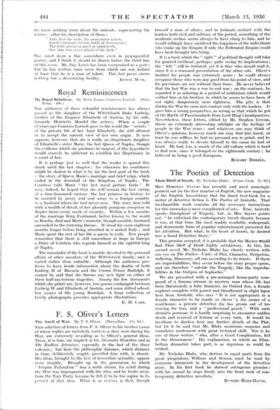The Poetics of Detection Thou Shell of Death. By Nicholas
Blake. (Crime Club. 7s. 6d.) Miss DOROTHY SAYERS has recently and most amusingly pointed out (in the first number of English, the new magazine of the English Association) that the finest text-book for a writer of detective fiction is The Poetics of Aristotle. That inexhaustible work contains all the necessary instructions for this (nowadays) most complicated of arts. True, Aristotle speaks throughout of Tragedy, but, as Miss Sayers points out, " he criticised the contemporary Greek theatre because it was, at that time, the most readily available, widespread, and democratic form of popular entertainment presented for his attention. But what, in his heart of hearts, he desired was a Good Detective Story."
This premise accepted, it is probable that the Master would find Thou Shell of Death highly satisfactory. In this, his second novel, Mr. Nicholas Blake has clearly written with one eye on The Poetics—Unity of Plot, Character, Peripeteia, Suffering, Discovery, all run according to its tenets. If there are improbabilities, they occur before the story proper opens, and are therefore " outside the Tragedy, like the improba- bilities in the Oedipus of Sophocles."
We are presented with a pre-arranged house-party com- posed of a famous airman (a mystery man whose life has been threatened), a fishy financier, an Oxford don, a female explorer complete with parrot and bloodhound (a slight lapse here from Aristotle, who says " It is not appropriate in a female character to be manly or clever "), the owner of a road-house, a private detective (he has grown out of his craving for tea), and a " professional peach." With such dramatis personae, it is hardly surprising to encounter sudden death and reversal of fortune at every turn. It would be invidious to disclose here any further details of the Plot, but let it be said that Mr. Blake maintains suspense and cumulates excitement with great technical skill. Nor is he one of those writers " who, after a Good Complication, fail in the Denouement." His explanation, in which an Eliza- bethan dramatist takes part, is as ingeniouS as could be wished.
Mr. Nicholas Blake, who derives in equal parts from his great progenitors, William and Sexton, must be read by everyone interested in the development of the detective story. In his first book he showed outrageous promise : with his second he steps firmly into the front rank of con- temporary detective novelists.
RUPERT HART-DAVIS.














































 Previous page
Previous page